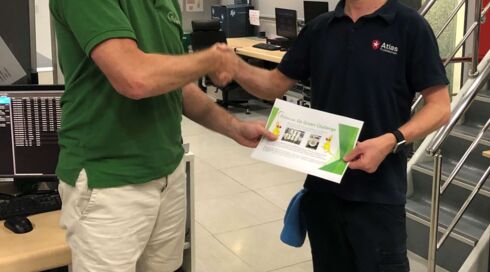3
Background
This Friday, the 9th of August, is recognised as International Day of the World's Indigenous People. The aim of this day is to raise awareness of the needs of these population groups. The 9th of August was chosen in recognition of the first meeting of the UN Working Group on Indigenous Populations held in Geneva in 1982.
The particular focus area for this year's International Day of the World's Indigenous People is Indigenous Languages.
Below are some key points regarding Indigenous culture and language:
• There are an estimated 370 million Indigenous people in the world, living across 90 countries
• The Indigenous population speak an overwhelming majority of the world's estimated 7,000 languages and represent 5,000 different cultures
• The Indigenous population make up less than 5 per cent of the world's population, but account for 15 per cent of the poorest
• It is estimated that, every 2 weeks, an Indigenous language disappears
Indigenous Australian languages today
More than 250 Indigenous Australian languages including 800 dialectal varieties were spoken in Australia at the time of European settlement in 1788. Only 60 traditional Indigenous languages are considered to be used today, and only 13 traditional Indigenous languages are still acquired by children.
Te Reo Māori (the Māori language)
Māori is only used in New Zealand and along with English is an official language of New Zealand.
Despite its official classification, the Māori language was in danger of dying out in the early 1900's and by the 1920's only a few schools taught Māori grammar with many parents encouraging their children to learn English. 'Korero Pakeha' (Speak English) was seen as essential as it was needed for the workplace and other activities.
Today the Māori language has gathered widespread support with an estimated 130,000 people speaking it.
Why are Indigenous languages important?
Languages play a crucially important role in the daily lives of all peoples, are pivotal in the areas of human rights protection, peace building and sustainable development, through ensuring cultural diversity and intercultural dialogue. However, despite their immense value, languages around the world continue to disappear at an alarming rate due to a variety of factors. Many of them are indigenous languages.
Indigenous languages in particular are a significant factor in a wide range of other indigenous issues, notably education, scientific and technological development, biosphere and the environment, freedom of expression, employment and social inclusion.
Atlas Professionals' Indigenous Engagement
Atlas Professionals is passionate about Australian Aboriginal and Torres Strait Islander engagement, training and employment strategies. Over the last decade we have developed a strong and positive relationship with many Indigenous individuals, communities, corporations and foundations.
Atlas Professionals currently manages several projects guiding Australian Indigenous seafarers to qualify as globally recognised Deck Officers or globally qualified Able Seafarer Deck and Engine Ratings. The projects are a first of their kind in Australia with both being fully funded by two tier one Oil and Gas companies with major projects currently operating in Australian waters.
The aim of both projects is to upskill Indigenous personnel in the maritime industry, thus promoting the maritime industry as an employment stream for Indigenous personnel. Both projects are multiyear in length with the aim being to upskill and qualify numerous Indigenous personnel. The majority of the current intake of trainee's are scheduled to be fully qualified towards the end of 2019.
.png)
.png)


